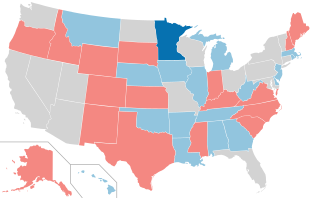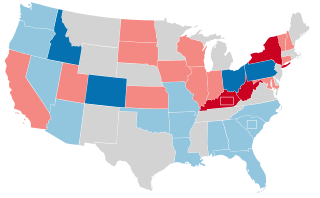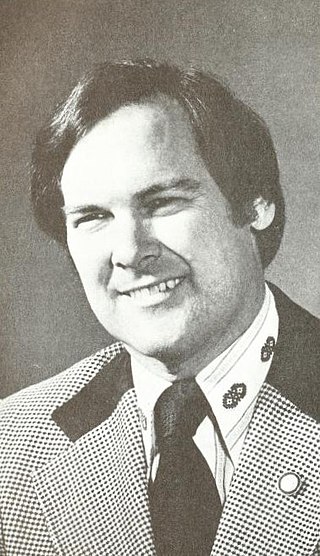
Jesse Alexander Helms Jr. was an American politician. A leader in the conservative movement, he served as a senator from North Carolina from 1973 to 2003. As chairman of the Senate Foreign Relations Committee from 1995 to 2001, he had a major voice in foreign policy. Helms helped organize and fund the conservative resurgence in the 1970s, focusing on Ronald Reagan's quest for the White House as well as helping many local and regional candidates.

The 1996 United States Senate elections were held on November 5, with the 33 seats of Class 2 contested in regular elections. Special elections were also held to fill vacancies. They coincided with the presidential election of the same year, in which Democrat Bill Clinton was re-elected president.

The 1990 United States Senate elections were held on Tuesday, November 6, 1990, with the 33 seats of Class 2 contested in regular elections. Special elections were also held to fill vacancies. The Democratic Party increased its majority with a net gain of one seat from the Republican Party. The election cycle took place in the middle of President George H. W. Bush's term, and, as with most other midterm elections, the party not holding the presidency gained seats in Congress.

The 1986 United States Senate elections were elections for the United States Senate. Held on November 4, in the middle of Ronald Reagan's second presidential term, the 34 seats of Class 3 were contested in regular elections. The Republicans had to defend an unusually large number of freshman Senate incumbents who had been elected on President Ronald Reagan's coattails in 1980. Democrats won a net of eight seats, defeating seven freshman incumbents, picking up two Republican-held open seats, and regaining control of the Senate for the first time since January 1981. This remains the most recent midterm election cycle in which the sitting president's party suffered net losses while still flipping a Senate seat.

The 1984 United States Senate elections were held on November 6, with the 33 seats of Class 2 contested in regular elections. They coincided with the landslide re-election of President Ronald Reagan in the presidential election. In spite of the lopsided presidential race, Reagan's Republican Party suffered a net loss of two Senate seats to the Democrats, although it retained control of the Senate with a reduced 53-47 majority. Democrats defeated incumbents in Illinois and Iowa, and won an open seat in Tennessee, while Republicans defeated an incumbent in Kentucky.

The 1978 United States Senate elections were held on November 7, in the middle of Democratic President Jimmy Carter's term. The 33 seats of Class 2 were contested in regular elections. Special elections were also held to fill vacancies.

The 1974 United States Senate elections were held on November 4, with the 34 seats of Class 3 contested in regular elections. They occurred in the wake of the Watergate scandal, Richard M. Nixon's resignation from the presidency, and Gerald Ford's subsequent pardon of Nixon. Economic issues, specifically inflation and stagnation, were also a factor that contributed to Republican losses. As an immediate result of the November 1974 elections, Democrats made a net gain of three seats from the Republicans, as they defeated Republican incumbents in Colorado and Kentucky and picked up open seats in Florida and Vermont, while Republicans won the open seat in Nevada. Following the elections, at the beginning of the 94th U.S. Congress, the Democratic caucus controlled 60 seats, and the Republican caucus controlled 38 seats.

The 1972 United States Senate elections were held on November 7, with the 33 seats of Class 2 contested in regular elections. They coincided with the landslide re-election of Republican President Richard Nixon. Despite Nixon's landslide victory, Democrats increased their majority by two seats. The Democrats picked up open seats in Kentucky and South Dakota, and defeated four incumbent senators: Gordon Allott of Colorado, J. Caleb Boggs of Delaware, Jack Miller of Iowa, and Margaret Chase Smith of Maine. The Republicans picked up open seats in New Mexico, North Carolina, and Oklahoma, and defeated one incumbent, William B. Spong Jr. of Virginia.

The 1968 United States Senate elections were elections for the United States Senate. Held on November 5, the 34 seats of Class 3 were contested in regular elections. They coincided with the presidential election of the same year. The Republicans picked up five net seats in the Senate. This saw Republicans win a Senate seat in Florida for the first time since Reconstruction.

The 1960 United States Senate elections coincided with the election of John F. Kennedy as president on November 8, 1960. The 33 seats of Class 2 were contested in regular elections. A special election was also held on June 28, 1960, for a mid-term vacancy in North Dakota where Democrats flipped a seat to expand their majority to 66-34. As Majority Leader Lyndon Johnson was elected Vice President, Mike Mansfield became the new Majority Leader.

The 1956 United States Senate elections were elections for the United States Senate that coincided with the re-election of President Dwight D. Eisenhower. The 32 seats of Class 3 were contested in regular elections, and three special elections were held to fill vacancies. Although Democrats gained two seats in regular elections, the Republicans gained two seats in special elections, leaving the party balance of the chamber unchanged.

The North Carolina United States Senate election of 1984 was held on November 6, 1984 as part of the nationwide elections to the Senate, and coinciding with the 1984 presidential election. The election was a showdown between the Republican incumbent Jesse Helms and then-incumbent Democratic Governor Jim Hunt. This election was one of the most dramatic in 1984. In the end, Helms won the election, the most expensive non-presidential election in United States history up to that point, by a margin significantly reduced from the margin that Helms achieved in 1978.

The North Carolina United States Senate election of 1996 was held on November 5, 1996 as part of the nationwide elections to the Senate, and coincided with the 1996 presidential election.

The North Carolina United States Senate election of 1972 was held on 7 November 1972 as part of the nationwide elections to the Senate, and coinciding with the 1972 presidential election. The general election was fought between the Republican nominee Jesse Helms and the Democratic nominee Rep. Nick Galifianakis. Helms won the election, becoming the first Republican to win a Senate seat in North Carolina since 1897, and the first to hold this seat since 1871.

John Randolph Ingram was an American Democratic politician, attorney, and insurance commissioner. He served as North Carolina's Commissioner of Insurance from 1973 until 1985.

The 1986 United States Senate election in North Carolina was held on November 4, 1986 as part of the nationwide elections to the Senate. Incumbent Republican U.S. Senator Jim Broyhill, who had been appointed in June 1986 to serve out the rest of John Porter East's term, faced off against the popular Democratic former Governor Terry Sanford.

The 1992 United States Senate election in North Carolina was held on November 3, 1992 as part of the nationwide elections to the Senate. Incumbent Democrat Terry Sanford lost re-election for a second term to Republican Lauch Faircloth, the former North Carolina Secretary of Commerce.

The 2013 United States elections were held on Tuesday, November 5, 2013. This off-year election cycle featured several special elections to the United States Congress; two gubernatorial races; state legislative elections in a few states; and numerous citizen initiatives, mayoral races, and a variety of other local offices on the ballot.

The 2014 United States House of Representatives elections in North Carolina were held on Tuesday, November 4, 2014 to elect the 13 U.S. representatives from the state of North Carolina, one from each of the state's 13 congressional districts. The elections coincided with other elections to the United States Senate and House of Representatives and various state and local elections, including an election to the U.S. Senate.

The 2016 Vermont Senate election took place as part of the biennial United States elections. Vermont voters elected State Senators in all 30 seats. State senators serve two-year terms in the Vermont Senate. The election coincided with elections for other offices including the Presidency, U.S. Senate, U.S. House, Governor, and State House. A primary election held on August 9, 2016 determined which candidates appeared on the November 6 general election ballot.



















